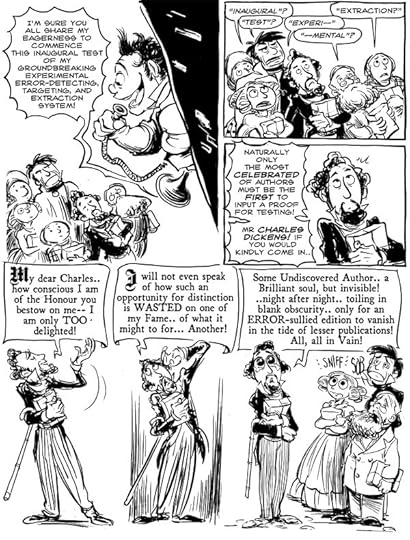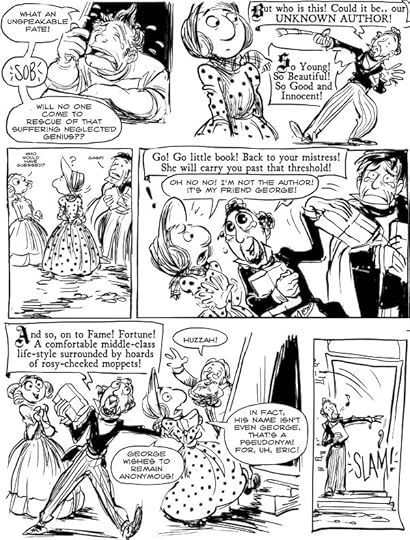User Experience Pages the 10th and 11th
Aaaaaaand we’re back. Sorry if the text is a little small.. I’m adjusting everything for print which is uncomfortable at this size, I’ll need to tweak the website design I think!


NOTES NOTES BEAUTIFUL NOTES!
It’s hard to come away from a biography of Dickens with feelings of unmingled affection (I especially have a short temper at the moment with authors possessed of bottomless torrents of productivity) so I’ve made him a bit of a stinker. I am altogether unjust in depicting him outing George Eliot– indeed, he wrote her a charming and highly Dickensian letter on reading the anonymous Scenes of Clerical Life:
You will not suppose that I have any vulgar wish to fathom your secret… If it should ever suit your convenience and inclination to show me the face of the man, or woman, who has written so charmingly, it will be a very memorable occasion to me.
Dickens would certainly have known what line to take to work on Babbage’s feelings- it’s pretty accepted that the inventor of the McGuffin-y mechanism in Little Dorrit, Mr Doyce, was based if not on Babbage, at least on Babbage’s situation–
‘This Doyce,’ said Mr Meagles, ‘is a smith and engineer. He is not in a large way, but he is well known as a very ingenious man. A dozen years ago, he perfects an invention (involving a very curious secret process) of great importance to his country and his fellow-creatures. I won’t say how much money it cost him, or how many years of his life he had been about it, but he brought it to perfection a dozen years ago. Wasn’t it a dozen?’ said Mr Meagles, addressing Doyce. ‘He is the most exasperating man in the world; he never complains!’
Aside– the modest, patient, uncomplaining, almost personality-less Doyce doesn’t much resemble Babbage, who complained A LOT and at length.. I wonder if Dickens wasn’t having a bit of fun with the Uncomplaining Doyce.
With this prelude, Mr Meagles went through the narrative; the established narrative, which has become tiresome; the matter-of-course narrative which we all know by heart. How, after interminable attendance and correspondence, after infinite impertinences, ignorances, and insults, my lords made a Minute, number three thousand four hundred and seventy-two, allowing the culprit to make certain trials of his invention at his own expense.
How the trials were made in the presence of a board of six, of whom two ancient members were too blind to see it, two other ancient members were too deaf to hear it, one other ancient member was too lame to get near it, and the final ancient member was too pig-headed to look at it. How there were more years; more impertinences, ignorances, and insults. How my lords then made a Minute, number five thousand one hundred and three, whereby they resigned the business to the Circumlocution Office. How the Circumlocution Office, in course of time, took up the business as if it were a bran new thing of yesterday, which had never been heard of before; muddled the business, addled the business, tossed the business in a wet blanket. How the impertinences, ignorances, and insults went through the multiplication table. How there was a reference of the invention to three Barnacles and a Stiltstalking, who knew nothing about it; into whose heads nothing could be hammered about it; who got bored about it, and reported physical impossibilities about it. How the Circumlocution Office, in a Minute, number eight thousand seven hundred and forty, ‘saw no reason to reverse the decision at which my lords had arrived.’ How the Circumlocution Office, being reminded that my lords had arrived at no decision, shelved the business. How there had been a final interview with the head of the Circumlocution Office that very morning, and how the Brazen Head had spoken, and had been, upon the whole, and under all the circumstances, and looking at it from the various points of view, of opinion that one of two courses was to be pursued in respect of the business: that was to say, either to leave it alone for evermore, or to begin it all over again.
My word that’s a lot of words! I must say I couldn’t fit HALF of what Dickens wanted to say into his sadly finite speech balloons. And I thought it was tough getting Lovelace’s dialogue in!




